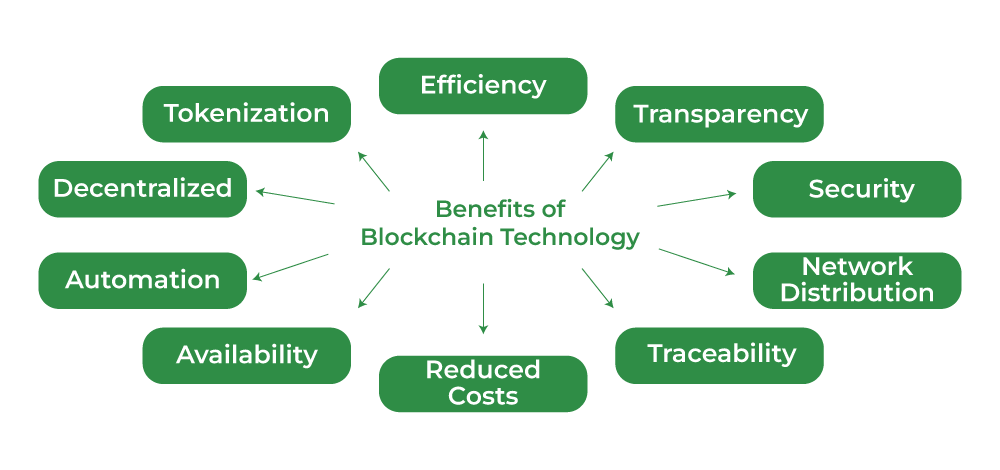Blockchain technology offers transparency, security, and traceability with its decentralized nature, eliminating the need for intermediaries. However, it faces challenges such as scalability issues, high energy consumption, and regulatory uncertainties.
Blockchain technology has become a significant innovation in recent years, revolutionizing various industries with its decentralized and secure nature. The transparency and immutability it provides have made it a popular choice for businesses looking to enhance trust and security. Despite its numerous advantages, blockchain technology also presents some drawbacks that need to be considered.
This article will delve into the pros and cons of blockchain technology, highlighting its benefits and limitations in today’s digital landscape. Let’s explore how blockchain technology is shaping the future of digital transactions and data management.
Advantages Of Blockchain Technology
The primary advantage of blockchain technology lies in the transparency, security, and traceability it offers. Decentralization eliminates the need for intermediaries, fostering a trustless environment. However, blockchain faces challenges, including scalability issues, high energy consumption, and regulatory uncertainties.

Challenges Faced By Blockchain Technology
Blockchain technology offers various advantages, such as transparency, security, and traceability. The decentralized nature eliminates the need for intermediaries, creating a trustless environment. However, blockchain does face several challenges that need to be addressed.
Scalability is one of the major issues faced by blockchain technology. As seen in the Bitcoin network, transactions can take longer to complete due to network congestion. This scalability problem needs to be resolved to ensure smooth and efficient transactions.
Another challenge is high energy consumption. Blockchain networks require significant computational power, which leads to increased energy consumption. Finding more energy-efficient solutions is crucial to minimize the environmental impact of blockchain technology.
Regulatory uncertainties also pose a challenge. The lack of clear regulations and guidelines for blockchain technology creates uncertainty for businesses and consumers alike. Establishing proper regulatory frameworks will foster trust and widespread adoption of blockchain technology.
Economic Implications
Blockchain technology offers transparency and security, fostering a trustless environment with decentralization. However, challenges like scalability issues, high energy consumption, and regulatory uncertainties present notable drawbacks in economic implications.
The economic implications of blockchain technology are significant. Cost associated with implementing blockchain in finance and business sectors can be high. It offers transparency and traceability, but scalability issues and regulatory uncertainties pose challenges. Blockchain eliminates intermediaries, creating a trustless environment. It requires significant energy, impacting sustainability. Despite advantages like security and decentralization, limitations in data modification and legal aspects may hinder adoption. The impact of blockchain on economic landscapes is complex and evolving.
Legal And Regulatory Aspects
The legal and regulatory aspects of blockchain technology present various challenges. One of the key concerns is related to privacy, as blockchain’s transparency can potentially compromise sensitive information. Additionally, the complexities of existing laws and regulations pose hurdles for the widespread adoption of blockchain technology, leading to uncertainties and potential conflicts. Addressing these challenges is crucial for the development of a regulatory framework that balances innovation and compliance.
Environmental Concerns
Blockchain technology offers many advantages such as decentralization, transparency, security, and traceability. It eliminates the need for intermediaries, creating a trustless environment. However, it also comes with some drawbacks, including scalability issues, high energy consumption, and regulatory uncertainties. Scalability is a concern as transactions can be delayed depending on network congestion. The energy consumption of blockchain networks is high, which raises environmental concerns. Additionally, regulatory uncertainties surrounding blockchain technologies can hinder adoption and implementation. Despite these challenges, the advantages of blockchain technology make it an attractive solution for various industries.
Social And Ethical Considerations
Blockchain technology offers traceability and transparency by providing a public ledger of transactions, enhancing trust and accountability. The potential for misuse is a concern, as anonymity can facilitate illicit activities. However, the benefits of transparency outweigh the risks, allowing for ethical considerations to be addressed.
Frequently Asked Questions For Pros And Cons Of Blockchain Technology
What Are Advantages And Disadvantages Of Blockchain?
Advantages of blockchain include transparency, security, and traceability. Decentralization eliminates intermediaries, fostering trust. Challenges include scalability, energy consumption, and regulatory uncertainties.
What Are The Negatives Of Blockchain?
Blockchain has some drawbacks, including scalability issues, high energy consumption, and regulatory uncertainties.
What Are The Pros And Cons Of Blockchain And Bitcoin?
The pros of blockchain are transparency, security, and traceability. Its decentralization eliminates the need for intermediaries. However, blockchain faces challenges including scalability, high energy consumption, and regulatory uncertainties. As for Bitcoin, it offers enhanced security, global accessibility, transparency, and low transaction costs.
But it also has cons such as significant price volatility and a lack of regulation.
What Is The Biggest Problem In Blockchain Technology?
The biggest problem in blockchain technology is scalability issues and high energy consumption. It also faces regulatory uncertainties.
Conclusion
Blockchain technology offers several advantages, including transparency, security, and traceability. Its decentralized nature eliminates the need for intermediaries, creating a trustless environment. However, blockchain also faces challenges such as scalability issues, high energy consumption, and regulatory uncertainties. Despite its potential drawbacks, the benefits of blockchain technology cannot be ignored.
As we move forward, it is important to continue exploring and addressing these challenges, while leveraging the advantages that blockchain technology brings to various industries.

